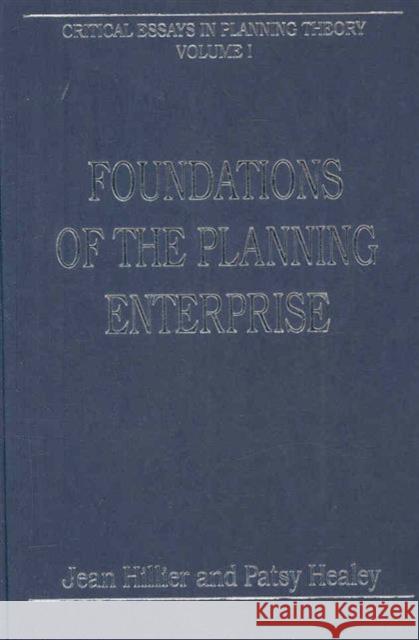Critical Essays in Planning Theory: 3-Volume Set » książka



Critical Essays in Planning Theory: 3-Volume Set
ISBN-13: 9780754627289 / Angielski / Twarda / 2008 / 1644 str.
Critical Essays in Planning Theory: 3-Volume Set
ISBN-13: 9780754627289 / Angielski / Twarda / 2008 / 1644 str.
(netto: 2688,88 VAT: 5%)
Najniższa cena z 30 dni: 2805,97
ok. 16-18 dni roboczych.
Darmowa dostawa!
Provides a collection of articles and papers on planning theory. These volumes are organised in a broadly chronological sequence, with major bodies of thought grouped together.
Contents: Volume 1: Foundations of the Planning Enterprise: Contents: Introduction, Jean Hillier and Patsy Healey; Part I The 'Project' of Planning Theory: Introduction, Patsy Healey and Jean Hillier; 2 centuries of planning theory: an overview, J. Friedmann; What is planning theory?, A Faludi; If planning is everything maybe it's nothing, A. Wildavsky; Dilemmas in a general theory of planning, M.M. Webber and H. Rittel ; Comparison of current planning theories: counterparts and contradictions, B. Hudson; Theoretical debates in planning: towards a coherent dialogue, P. Healey, G. McDougall and M. Thomas Towards a new typology of urban planning theories, O. Yiftachel; Without a net: modernist planning and the postmodern abyss, R. Beauregard; New directions in planning theory, S. Fainstein. Part II Inspirational Precursors: Introduction Jean Hillier and Patsy Healey; The town-country magnet, E. Howard; Civics: as concrete and applied psychology, P. Geddes; The myth of megalopolis, L. Mumford; Introduction: TVA and democratic planning, P. Selznick; Planning and democracy F. A. Hayek ; The concept of social control: planning as the rational mastery of the irrational, K. Mannheim. Part III Planning as Rational Scientific Management: Introduction, Patsy Healey and Jean Hillier; A choice theory of planning, P. Davidoff and T.A. Reiner; The science of 'muddling through', C.E. Lindblom; The guidance and control of change: physical planning as the control of complex systems, J.B. McLoughlin; The rationale of planning theory, A. Faludi; Advocacy and pluralism in planning, P. Davidoff; Social planning, social planners and planned societies, J. Dyckman; A ladder of citizen participation, S.R. Arnstein ;Examining the policy-action relationship, S. Barrett and C. Fudge; Foundations, John Friend and Allen Hickling; Re-examining the international diffusion of planning, S. Ward; Index. Contents: Volume 2: Political Economy, Diversity and Pragmatism: Contents: Introduction, Jean Hillier and Patsy Healey: Part 1 Critical Political Economy: Introduction, Jean Hillier and Patsy Healey; Urban planning in theory and practice: a reappraisal, Allen Scott and S.T. Roweis; The theory of capitalist underdevelopment, Andre Gunder Frank; New debates in urban planning: the impact of Marxist theory in the United States, Susan Fainstein and Norman Fainstein; On planning the ideology of planning, David Harvey; In search of spatial order, Christine Boyer; The kind of problem a city is, Jane Jacobs; Dilemmas of equity planning: a personal memoir, Norm Krumholz; Collective consumption and urban contradictions in advanced capitalism, Manuel Castells; The recovery of territorial life, John Friedmann and Clyde Weaver. Part 2 The Turn to Diversity: Introduction, Jean Hillier and Patsy Healey; Postmodernism and planning, Michael Dear ; Between modernity and postmodernity: the ambiguous position of US planning, R.A. Beauregard ; Feminist theory and planning theory: the epistemological linkages, L. Sandercock and A. Forsyth; Planning history and the black urban experience: linkages and contemporary implications, June Manning Thomas ; Planning and social control: exploring the dark side, O. Yiftachel; Planning, Peter Marris; Environmental ethics and the field of planning: alternative theories and middle-range principles, T. Beatley The historical roots of ecological modernisation, Maarten Hajer. Part 3 Critical Pragmatism: Introduction, Pat Healey and Jean Hillier; From technical rationality to reflection in action, Donald Schon; Understanding planning practice: an empirical, practical and normative account, John Forester; A classical liberal (libertarian) approach to planning theory, T.L. Harper and S.M. Stein; Pragmatic rationality and planning theory, N. Verma; A pragmatic inquiry about planning and power, C. Hoch; Aristotle, Foucault and progressive phronesis, Bent Flyvberg; Index. Contents: Volume 3: Contemporary Movements in Planning Theory: Contents: Introduction, Jean Hillier and Patsy Healey; Part 1 Communicative Practices and the Negotiation of Meaning: Introduction, Jean Hillier and Patsy Healey; The transactive style of planning, John Friedmann; Understanding planning practice, John Forester; A planner's day, P. Healey; The argumentative or rhetorical turn in planning, J.A. Throgmorton; Planning theory's emerging paradigm: communicative action and interactive practice, J. Innes; Strategies, processes and plans, Patsy Healey; Consensus-building as role-playing and bricolage, J. Innes and D. Booher; Communicative planning theory: a Foucauldian assessment, R. Fischler; Strife: urban planning and agonism, J. Pløger; Conflicting rationalities: implications for planning theory and practice, V. Watson. Part 2 Networks, Institutions and Relations: Introduction, Patsy Healey and Jean Hillier; Postscript: a manifesto for a progressive networked urbanism, Stephen Graham and Simon Marvin; Network power for collaborative planning, D. Booher and J.
Jean Hillier is Associate Dean and Chair of Sustainability and Urban Planning at RMIT University, Melbourne, Australia and Patsy Healey is Emeritus Professor at the School of Architecture, Planning and Landscape, University of Newcastle upon Tyne, UK.
1997-2026 DolnySlask.com Agencja Internetowa
KrainaKsiazek.PL - Księgarnia Internetowa









